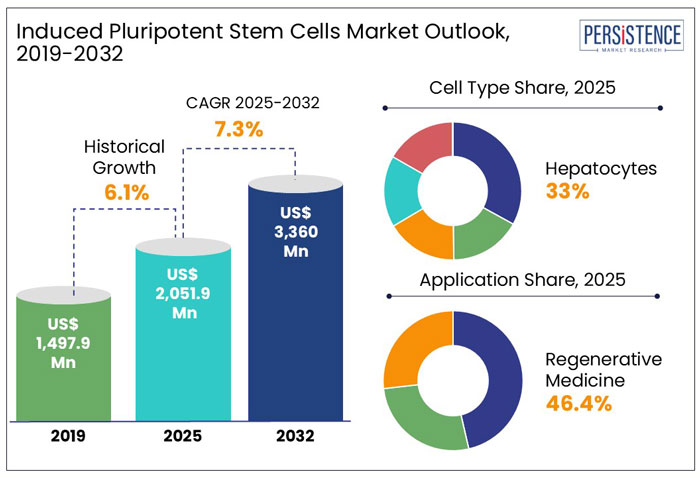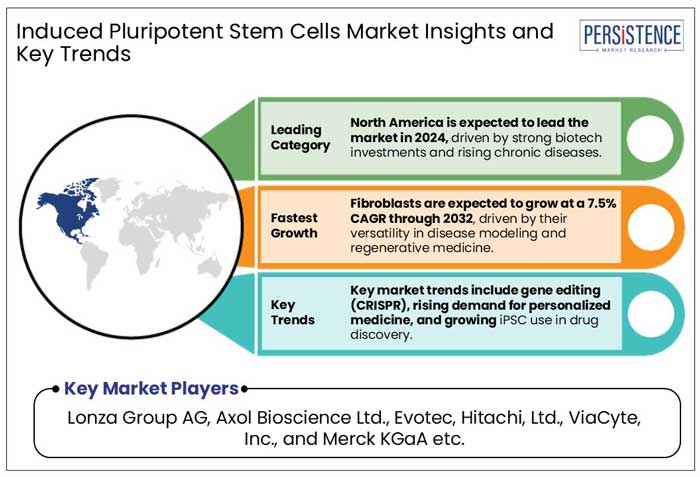Industry: Healthcare
Published Date: March-2025
Format: PPT*, PDF, EXCEL
Delivery Timelines: Contact Sales
Number of Pages: 271
Report ID: PMRREP17968
According to Persistence Market Research the Global Induced Pluripotent Stem Cells Market is estimated to increase from US$ 2,051.9 Mn in 2025 to US$ 3,360.0 Mn by 2032. The market is projected to record a CAGR of 7.3% during the forecast period from 2025 to 2032.

Key Highlights of the Market
|
Market Attributes |
Key Insights |
|
Global Induced Pluripotent Stem Cells Market Size (2025E) |
US$ 2,051.9 Mn |
|
Projected Market Value (2032F) |
US$ 3,360.0 Mn |
|
North America Market Growth Rate (CAGR 2025 to 2032) |
7.3% |
|
Historical Market Growth Rate (CAGR 2019 to 2023) |
6.1% |
|
Country |
Market Share in 2024 |
|
North America |
~39.2% |
In 2024, North America is capturing a dominant 39.2% share of the global induced pluripotent stem cells (iPSCs) market, driven by the region’s increasing burden of chronic diseases and rising investments in regenerative medicine.
The U.S. leads the market, backed by robust funding from organizations like the NIH, which allocated over $2 billion for stem cell research in recent years. Additionally, the growing adoption of iPSC-derived therapies for neurodegenerative and cardiovascular diseases fuels industry expansion. With major biotech firms and academic institutions focusing on personalized treatments, North America remains at the forefront of stem cell advancements, fostering innovation and commercialization.
This micromedicine procedure makes it possible to understand the progression of the disease at an individual patient level and also screen for optimal pharmacological drugs individually. High-throughput analyses for drug toxicity that use human iPSC-CMs can also be conducted using micromedicine, under which iPSC-based medicine could be applied to cohorts of patients. In these clinical trials, iPSCs generated from patients could be differentiated with functional cells and are used to analyse the effectiveness of the drugs. The ongoing research in the region is expected to pave the way for future investments in the market.
|
Category |
CAGR through 2032 |
|
By Cell Type - Hepatocytes |
33.0% |
In 2024, the Hepatocytes segment held the largest share, contributing 33.0% of market revenue.
The Induced Pluripotent Stem Cells (iPSCs) market is segmented by derived cell types into Hepatocytes, Fibroblasts, Keratinocytes, Neurons, and Others. This dominance is attributed to its critical role in liver disease modeling, drug metabolism research, and regenerative medicine. iPSC-derived hepatocytes provide a scalable and physiologically relevant cell source for liver cell therapy and drug screening, addressing the growing demand for innovative liver disease treatments and enhancing preclinical drug development.
Growing investment in fundamental research, particularly by academic institutions and research organizations, has greatly enhanced the understanding of molecular pathways involved in disease development. In recent years, studies on induced pluripotent stem cells (iPSCs) have provided deeper insights into gene regulation, improving knowledge of disease mechanisms, diagnostic potential, and therapeutic strategies. iPSCs share a gene expression profile with embryonic stem cells (ESCs), retaining both pluripotency and self-renewal capabilities, making them invaluable for regenerative medicine and drug discovery.
A key trend in the industry is the increasing complexity of research demands, reflecting a growing understanding of biological pathways and the discovery of novel regulatory mechanisms. This evolution highlights the need for manufacturers of research tools and reagents to stay ahead of scientific advancements, ensuring they align with the rapidly evolving requirements of the life sciences sector.

The global market for Induced Pluripotent Stem Cells recorded a CAGR of 6.1% over the 2019 to 2023 historical period.
The market for induced pluripotent stem cells (iPSCs) has grown steadily due to developments in drug discovery, regenerative medicine, and disease modeling. Applications for iPSCs have grown over the last several years due to advances in cell reprogramming technology and increased funding for stem cell research. Improved biopharmaceutical screening models and growing demand for tailored treatments have historically driven market expansion.
In the future, advancements in bioprocessing, automation, and gene editing should hasten market growth. Adoption will be accelerated by the incorporation of artificial intelligence into stem cell research and growing clinical applications, establishing iPSCs as a key component of upcoming biomedical innovations.
The global Induced Pluripotent Stem Cells Market is predicted to exhibit high growth at a value CAGR of 7.3% and reach a market size of US$ 3,360.0 Mn by 2032.
The growing incidence of chronic diseases is a key factor propelling the expansion of the Induced Pluripotent Stem Cells (iPSCs) market.
The increasing prevalence of chronic diseases is a major driver of growth in the Induced Pluripotent Stem Cells (iPSCs) market, as these cells offer promising applications in disease modeling, drug discovery, and regenerative medicine.
These trends are increasing the demand for iPSC-derived neuronal models, facilitating better disease understanding and the development of targeted therapies. As chronic diseases continue to rise, the iPSCs market is poised for sustained expansion.
iPSC-derived cell models are playing a crucial role in studying these diseases, developing personalized treatments, and advancing regenerative medicine. With chronic disease rates steadily climbing, the demand for iPSC applications in drug discovery and precision medicine is expected to drive significant market growth.
High Cost of Cell Lines Development Restricting Adoption
Increasingly complex requirements from researchers in the Life Science domain have led to the development of novel products that are expensive. Due to the uncertainties in the results expected from complex experiments, several users do not prefer to invest in such expensive products, especially for research groups with limited budgets and funding.
iPSC derivation is very costly, which is a limiting factor for most laboratories when multiple patient samples are reprogrammed. Custom research products and services are usually several-fold more expensive than products listed on catalogs of most of the major suppliers of research products. However, there is an increasing trend towards preference for premium products as they are of a higher quality than the standard reagents and products.
Expanding Role of iPSCs in Regenerative Medicine, Disease Modeling, and Personalized Therapeutics Development
The global Induced Pluripotent Stem Cells (iPSCs) market presents significant future opportunities driven by advancements in regenerative medicine, precision therapies, and drug discovery. The increasing demand for personalized treatments is expected to boost iPSC-derived cell models for conditions such as Parkinson’s, Alzheimer’s, and cardiovascular diseases. With the global burden of neurodegenerative disorders projected to rise by over 50% by 2050, companies can leverage iPSCs to develop novel therapeutic strategies.
Additionally, the rising prevalence of conditions such as Alzheimer’s, Parkinson’s, and spinal cord injuries has fueled demand for iPSC-derived neuronal models. These models enable researchers to investigate disease mechanisms, test emerging therapies, and advance regenerative treatments.
Additionally, CRISPR gene editing and 3D bioprinting technologies are creating new avenues for tissue engineering and disease modeling. The expansion of automated cell culture systems will further enhance large-scale production, addressing cost and scalability challenges. Strategic collaborations between biotech firms and academic institutions are also fueling innovation. Emerging markets in Asia-Pacific and the Middle East provide untapped potential for expansion, with increasing government funding and research initiatives supporting iPSC-based therapies.
Despite the presence of several large-scale players as well as multiple regional companies in the global iPS cell market, there are very limited companies that have a complete focus on being a provider of life science reagents and products. Different manufacturers have different product offerings and specializations, with most large companies combining research products and reagents with equipment and in-vitro diagnostics tools. Having a sole focus on this market ensures better quality of products, customer loyalty and an established distribution network that can increase the availability of the product across the globe.
The spending by companies on research and development pertaining to life sciences is expected to provide lucrative prospects for growth. Companies investing in providing tools and products to cater to the research requirements of several healthcare providers and research institutes can expect to see stable returns.
|
Attributes |
Details |
|
Current and Forecast Period |
2024 to 2032 |
|
Historical Data Available for |
2019 to 2023 |
|
Market Analysis |
US$ Million for Value |
|
Key Country Covered |
|
|
Key Market Segments Covered |
|
|
Key Companies Profiled |
|
|
Report Coverage |
|
|
Customization & Pricing |
Available upon request |
By Cell Type
By Application
By End User
By Region
To know more about delivery timeline for this report Contact Sales

The spices are estimated to increase from US$ 2,051.9 Mn in 2025 to US$ 3,360.0 Mn by 2032.
Rising regenerative medicine demand, advancements in gene editing, increasing R&D funding, and expanding applications in drug discovery propel growth.
Lonza, Axol Bioscience Ltd., Evotec, Hitachi, Ltd., ViaCyte, Inc., and Merck KGaA are some of the leading industry players.
The market is projected to record a CAGR of 7.3% during the forecast period from 2025 to 2032.
Personalized regenerative medicine, leveraging iPSCs for patient-specific therapies, presents a major opportunity, driving advancements in disease modeling and drug discovery.